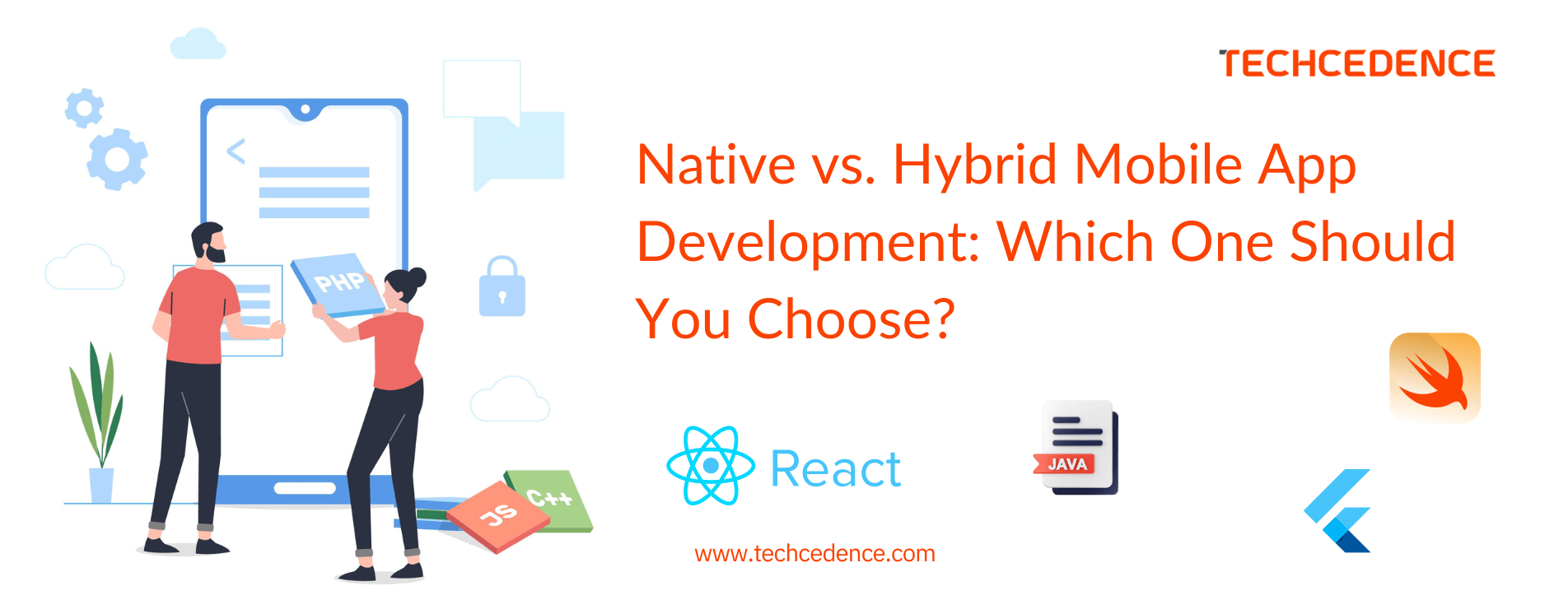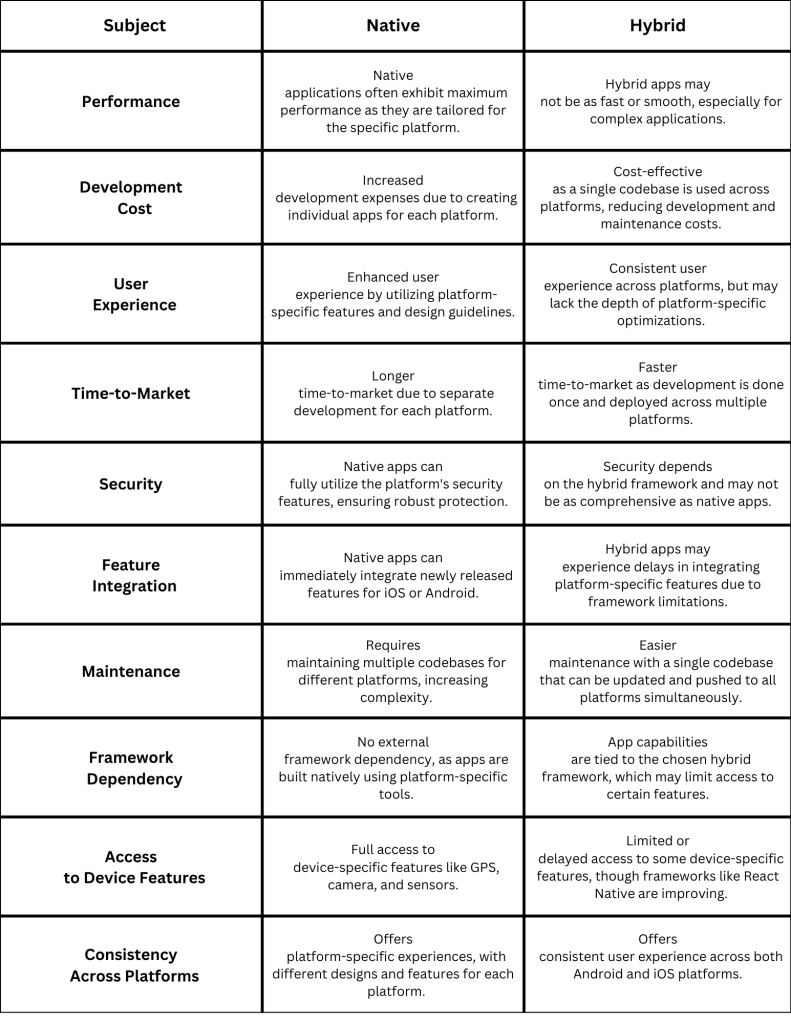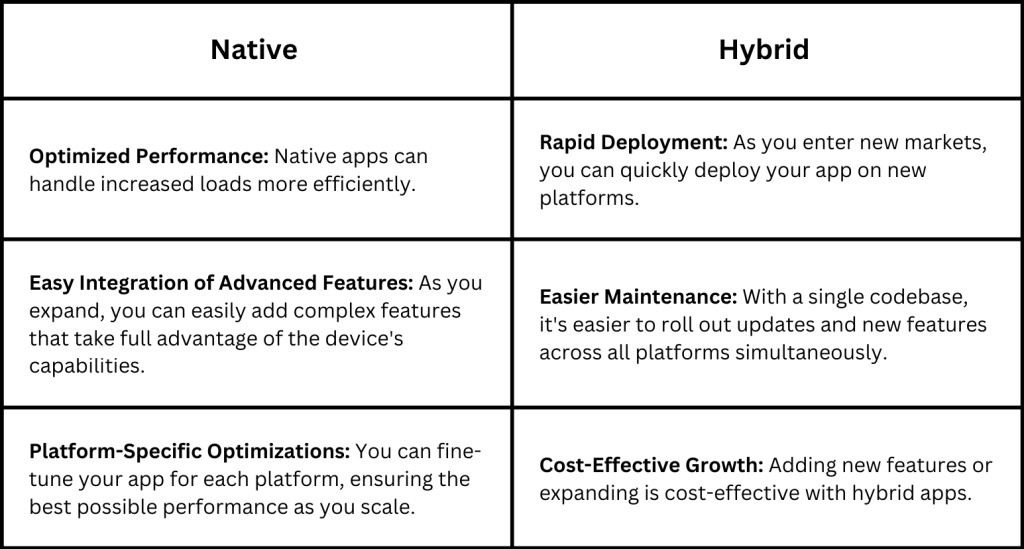
Categories : Uncategorized
Author : vivekkumarp Date : Oct 8, 2024
One of the most important decisions businesses face when looking for a mobile application is to decide between native and hybrid mobile apps. This choice has a significant impact on the performance, user experience, and long-term sustainability of the mobile application. Since mobile devices have become a part of our day-to-day life, having a strong presence in them is the path to digital sustainability of the business. This blog focuses on what really matters when deciding upon the mobile platform.
Understanding the Nature of App Development
Native App Development
Native Android development often involves Java or Kotlin and iOS developers typically use Swift, Swift UI, or Objective-C. This means we are using the programming languages and tools that are designed exclusively for that particular platform. These programming languages and tools are designed specifically for each platform, allowing full utilization of device features like the camera, GPS, or accelerometer, as they align with the platform’s native language.
Hybrid App Development
The development of these apps involves the use of web technologies like HTML, CSS, and JavaScript, followed by enclosing them in a native container, allowing them to run on different platforms with a single codebase. The increasing adoption of hybrid app development can be attributed to frameworks like React Native, Ionic, or Flutter. These applications are not limited to particular platforms and can run on both Android and iOS operating systems.
The Benefits and Challenges

Scalability and Future Proofing
While choosing between the native and Hybrid App development another crucial thing to consider is not just the current needs but also the future growth plans. Both Native and Hybrid provide different types of scalabilities but being native offers the business more scalable and future-proof.

When deciding between native and hybrid apps, several factors come into play.
Cost: The budget for the mobile application depends on resource availability and specific requirements. Clearly defining the development process, including features, platforms, and technologies, helps conduct an efficient cost analysis.
Complexity: Applications vary in complexity based on business needs. Conducting a feasibility study to assess which technology can best handle the app’s complexity ensures optimal performance and aligns with the business process.
Long-term sustainability: Businesses must consider the app’s future evolution, including how it will accommodate new features, user growth, and platform updates, to meet long-term user needs.
Maintenance: Like development, app maintenance requires dedicated resources. A clear roadmap of future developments and priorities helps businesses allocate maintenance efforts efficiently and plan for upcoming changes.
Some of the best examples of native apps are Instagram, Spotify, and WhatsApp. Instagram has historically leveraged native development to quickly integrate platform-specific features like camera functionality and background activity, enhancing the user experience. Similarly, Spotify uses native development to optimize performance, particularly for streaming services that require real-time data processing and smooth operation across different devices. WhatsApp also benefits from native technologies, offering a seamless, low-latency messaging experience with maximum optimization for security and performance across iOS and Android.
On the other hand, hybrid app development is exemplified by companies like Uber, Airbnb, and Pinterest. Uber uses a hybrid framework to streamline its development process, allowing it to maintain a single codebase for both iOS and Android, though real-time features like location tracking can present challenges. Airbnb adopted React Native to expedite app development and offer a uniform experience across platforms, though it occasionally encounters difficulties with platform-specific features. Pinterest also utilizes a hybrid approach, prioritizing faster time-to-market and cross-platform updates, though it has faced minor performance issues, especially in handling media-heavy content.
Mobile application development services provided by professionals assist businesses in evaluating the advantages and disadvantages of each approach, enabling them to make well-informed decisions based on their specific business requirements. As your mobile application development partner, Techcedence ensures the delivery of high-quality app development, continuous updates to incorporate the latest technologies, and scalability to accommodate business growth.
The ongoing evolution of mobile technology may diminish the distinction between native and hybrid development. With the constant emergence of new tools and frameworks, additional options are continually arising, potentially altering the landscape of mobile app development.
Remaining well-informed, establishing clear priorities, and being open to adaptation as your business expands and technologies evolve are crucial. Whether opting for native development due to its performance and user experience or choosing hybrid for its cost-effectiveness and faster deployment, it is important to remember that the primary objective is to develop an app that better serves your business.
References:
https://engineering.atspotify.com